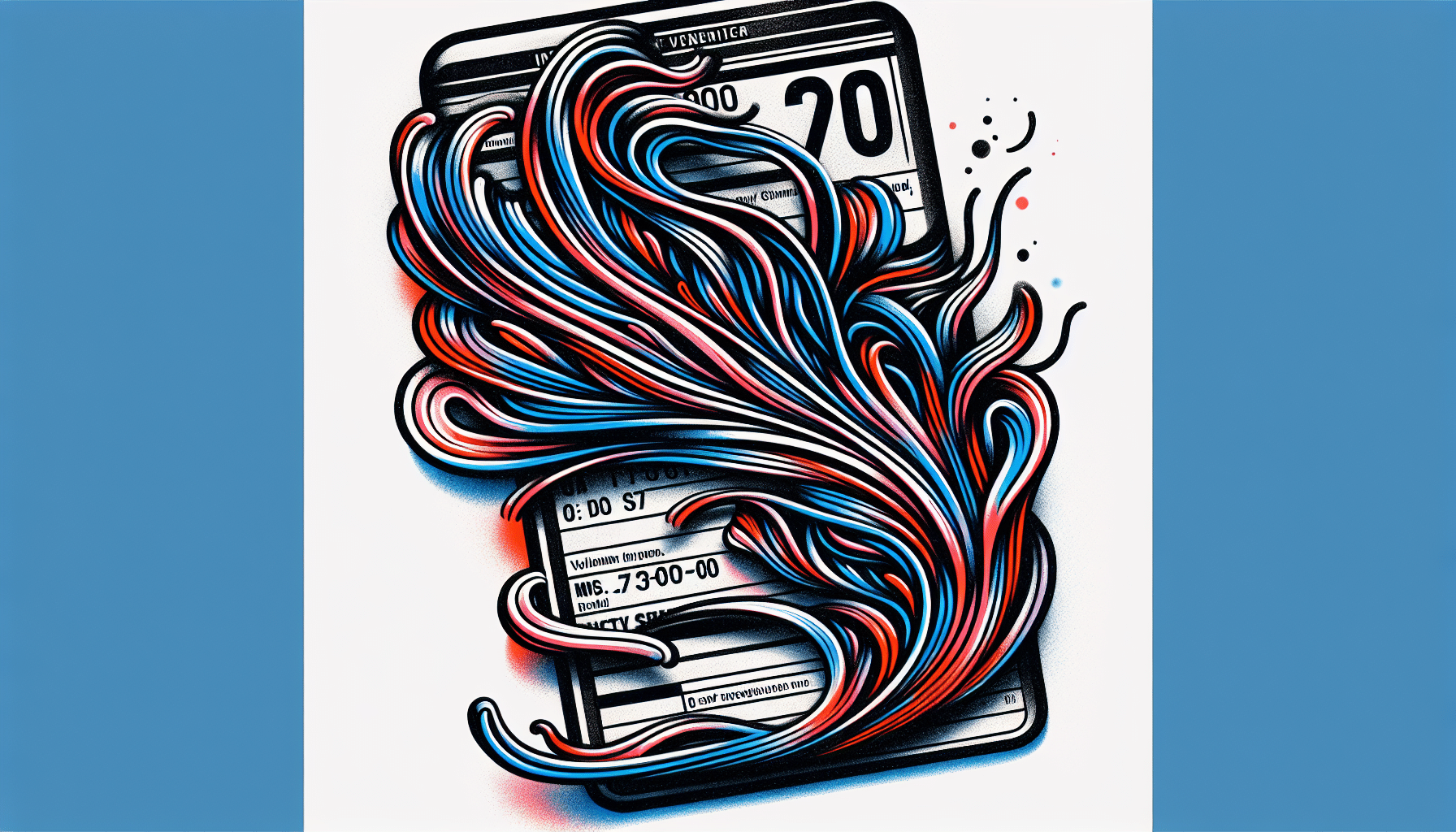Wondering when does a ticket go off your record, especially a speeding ticket?
Typically, it can stay there for three to five years, but this varies by state and the seriousness of the offense. In this article, we’ll guide you through state-specific durations, the impact on your car insurance, and tips to manage your driving record.
Key Takeaways
- The duration a speeding ticket stays on a driving record varies by state, typically lasting between three to seven years, impacting both driving privileges and insurance rates.
- Severe traffic offenses like DUI or reckless driving have much longer-lasting consequences, often leading to permanent marks on driving records and substantial increases in car insurance premiums.
- Drivers can mitigate the impact of speeding tickets on their records and insurance costs through defensive driving courses, traffic school, or by seeking deferrals in court, while also exploring insurance discounts and comparison shopping.
Introduction
Imagine cruising down the highway, wind in your hair, music up, only to be jolted back to reality by the sight of red and blue lights in your rearview mirror.
A speeding ticket can feel like a storm cloud over a perfect day. But it’s not just the immediate inconvenience or fine that’s troubling; it’s the lingering question of how this ticket will affect your future driving privileges and car insurance premiums.
The answer isn’t so straightforward, as you might imagine. Depending on where you live, that ticket could haunt your driving record for up to five years.
This article delves into this issue, providing insights and strategies to help you manage your driving history and mitigate its effect on your car insurance rates.
How Long Does a Speeding Ticket Stay on Your Driving Record?

Driving records are like a driver’s report card, and nobody wants a bad grade, especially one that sticks around. The duration of a speeding ticket on your driving record typically spans between three and five years, but don’t set your watch just yet.
A cocktail of factors including the severity of your foot’s heaviness on the pedal, your recent ticket history, and the laws that govern the roads in your state will determine how long you’ll be ‘paying’ for that moment of indiscretion.
The interplay of traffic laws, including the posted speed limit, and individual driving habits ultimately determines the duration of a speeding violation on your driving record.
State-Specific Durations for Traffic Tickets
As diverse as our United States are in culture and climate, so too are the variations in how they treat speeding tickets. In the Golden State of California, for instance, a speeding ticket can linger on your record from three to seven years.
While it may initially affect your insurance rates for a period of three to five years, the violation itself is a stubborn resident on your driving record. It’s a peculiar quirk of the California system that while insurance companies may forgive with time, the record itself does not forget.
In other states, the duration a speeding ticket can remain on your record is as diverse as their landscapes.
Impact of Serious Offenses
Get caught committing a serious traffic offense, and you might find yourself in deeper water. If your foot’s faux pas escalates to the level of a DUI or reckless driving, the consequences become far graver and longer-lasting, often leaving a permanent mark on your driving record.
The disparity between states is stark; a DUI will haunt Californian drivers for a decade and a half, while Floridians will find it on their record for a staggering three-quarters of a century.
Beyond the shadow on your record, these severe missteps can lead to insurance policy cancellations, catapulting you into the realm of high-risk drivers.
How Traffic Tickets Affect Car Insurance Rates
When it comes to car insurance, a clean driving record is your golden ticket to affordable rates. Conversely, traffic tickets can be the bane of your car insurance bill, with the potential to propel your premiums up by an eye-watering 82%.
But before you resign yourself to a life of ramen noodles to afford your car insurance, know that the system isn’t entirely unforgiving. Insurers will weigh factors like:
- Location of your infraction
- Length of time since your last offense
- Whether you’ve been a serial speedster or just had a momentary lapse in judgment
Car insurance companies juggle a delicate balance of risk assessment, and a speeding ticket can significantly upset that balance.
Average Rate Increases by Violation Type
Not all traffic violations are created equal in the eyes of insurance companies. A hit-and-run could see your rates surge by over 80%, while refusing to take a breathalyzer test isn’t far behind with an increase of about 74%. DUI offenses are equally unforgiving, with a similar rate hike.
On the other hand, a speeding ticket typically nudges your premium up by a quarter of its current rate. Even minor violations like failing to buckle up can still pinch your pocket, albeit to a lesser degree.
Duration of Insurance Rate Increases
The aftermath of a traffic ticket on your insurance rates isn’t eternal, but it can feel like an age. Generally, car insurance companies will penalize your premiums for about three years following a speeding ticket. However, if you’ve been a repeat performer in the traffic violation theater, that period could extend.
Mark your calendar for three to five years after your ticket; during this period, shopping around for new insurance quotes might reveal more lenient premiums.
Reducing Points on Your Driver’s License

For many drivers, points on the license are like calories in a dessert—best kept to a minimum. Luckily, there are ways to trim the excess. Defensive driving courses are the gym membership for your driving record, potentially reducing points by up to four.
These points can be shaved off for violations that occurred within the last year and a half, but it’s not a get-out-of-jail-free card; your total can’t dip below zero.
This proactive measure helps maintain your driving privileges and prevents your insurance rates from skyrocketing.
Defensive Driving Courses
Enrolling in a defensive driving course can be a strategic move beyond point reduction. Many of these courses are available online, making them a convenient way to potentially dismiss a citation and keep your car insurance premiums from skyrocketing.
Insurance companies often reward drivers who take the initiative to improve their driving skills with discounts.
However, if you’re already dealing with a violation, don’t count on the course to alter the course of ongoing legal proceedings or license suspension.
Safe Driving Practices
While defensive driving courses are a formal step towards point reduction, cultivating safe driving habits is the everyday diet that keeps your driving record lean.
State-approved driver improvement courses offer another route to points reduction, particularly helpful for speeding tickets. In some places like Florida, these courses can also cut down your citation fees.
Keeping your driving record spotless over time is the best way to minimize points and ensure that negative marks don’t stay on your record, steering clear of further penalties.
Removing a Speeding Ticket from Your Record

At times, a speeding ticket can feel like a permanent stain on your driving record, but there are ways to potentially erase it. Contesting the ticket in court is a bold strategy that, if successful, could mean dropped charges and no fines.
You might also seek a deferral or delay the court hearing, which can work in your favor if the issuing officer doesn’t show up.
Deferred adjudication is another avenue worth exploring, depending on your state’s laws. The process might be challenging, but with the right approach and possibly a traffic expert by your side, you have a chance to clear your record.
Contesting the Ticket in Court
Taking your speeding ticket to court isn’t just about bravado; it’s about justice and accuracy. Successfully contesting the ticket can mean the difference between a blemished driving record and maintaining your good driver status.
A plea bargain might result in reduced penalties, and if the stars align—namely, if the officer is a no-show—your ticket could be dismissed entirely.
Strong evidence, such as discrepancies on the ticket, can sway the court in your favor. It’s a risk worth taking as it could result in stable insurance rates and a clean record.
Traffic School Eligibility
When faced with a speeding ticket, traffic school might be the lifeline you need. However, eligibility for this escape hatch is not universal. Generally, you’re allowed to attend traffic school once every 18 months to address infractions that don’t exceed 25MPH over the limit and adhere to specific vehicle codes.
If you’re a commercial driver, though, you’ll need to find another route, as these courses are typically reserved for non-commercial drivers.
Attending Traffic School

Attending traffic school isn’t just a day out of your life; it’s a strategic move that can keep minor violations off your record. In some states, completion of a traffic school course can lead to ticket dismissal and prevent points from appearing on your record in the first place.
Such an investment not only saves you from points but could also help keep your insurance premiums low. However, bear in mind that most states restrict how frequently you can use traffic school to dismiss tickets, so drive prudently and reserve your traffic school opportunity for when it’s truly necessary.
Other Factors Influencing Car Insurance Costs
While a speeding ticket can certainly cause your car insurance rates to spike, it’s not the only factor at play. Insurers consider a smorgasbord of personal and situational elements when pricing your policy. These include your age, with younger drivers often facing steeper rates due to their inexperience. Your credit score is also scrutinized, as it’s believed to correlate with the likelihood of filing claims.
Where you live can significantly impact your premiums, thanks to state regulations and the risk profile of your ZIP code. Even gender can play a role, particularly for young drivers, with males generally paying more.
Non-Moving Violations
If you’re sweating over that parking ticket you received last week, you can relax—at least when it comes to your insurance rates. Non-moving violations like a ticket for parking in a no-parking zone have no direct impact on your car insurance premiums.
These violations are not seen as reflective of your driving ability or risk level on the road. So while they might be a nuisance and lighten your wallet at the moment, they won’t contribute to your insurance costs.
Bundling and Discounts
For savvy consumers looking to mitigate the impact of traffic tickets on insurance costs, bundling policies and snagging discounts can be a game-changer.
Combining your auto insurance with home insurance, for example, can lead to a happier wallet thanks to lower overall rates. Don’t overlook discounts for good students, either.
Young drivers who hit the books can often benefit from reduced premiums, reflecting their commitment to responsibility both in and out of the classroom.
Finding Affordable Car Insurance After a Speeding Ticket
Has a speeding ticket left you fretting about the cost of your car insurance? Take heart; there are strategies to navigate this financial speed bump.
Here are some steps you can take to find a more affordable policy:
- Compare quotes from different insurers.
- Consider lowering your coverage or raising your deductible to reduce costs.
- Don’t overlook potential discounts, such as paying in full or being a defensive driver.
Every little bit helps when it comes to saving on cheap car insurance, especially when utilizing car insurance discounts.
Comparing Quotes from Different Insurers
Your current car insurance company might not be very sympathetic after a speeding ticket. That’s why it’s crucial to shop around. Taking the time to compare quotes from various insurers can potentially save you a significant amount of money.
Although the temptation to stick with what you know may be strong, remember that loyalty doesn’t guarantee the best rates. An annual comparison of quotes ensures you’re not overpaying for your car insurance.
Exploring Usage-Based Insurance Programs

Usage-based insurance programs offer a gleam of hope for affordable car insurance after a speeding ticket. These programs offer a different approach by monitoring your driving behavior and rewarding safe driving habits with lower rates.
By enrolling in such a program, you can take control of your insurance costs and potentially see significant discounts based on how and how much you drive.
This gives you the chance to demonstrate through your driving that one speeding ticket doesn’t define your risk profile to insurers.
Best Car Insurance Companies for High-Risk Drivers
If your driving record has taken a few hits, fear not. Certain car insurance companies specialize in offering more favorable terms to high-risk drivers, including those with multiple traffic tickets. Some of these companies include:
- State Farm: renowned for its customer satisfaction and affordable rates for various infractions
- Erie Insurance: particularly known for its approach to at-fault accidents
- Geico: offers competitive coverage options for drivers with speeding tickets
- Progressive: offers competitive coverage options for drivers with DUIs
- USAA: caters especially to military members with stellar customer satisfaction rates
The key is to find the right fit that takes into account your past but also recognizes your efforts to improve your driving habits.
Summary
Navigating the muddy waters of a speeding ticket’s impact on your driving record and car insurance rates can be daunting. We’ve explored the varying durations a ticket can stay on your record, the significant influence of serious offenses, and how different violations affect insurance rates.
Strategies like taking defensive driving courses, safe driving practices, and contesting tickets in court can help mitigate the damage. We’ve also touched on factors beyond traffic tickets that affect your insurance costs and how to find more affordable rates post-ticket.
Remember, a speeding ticket isn’t the end of the road; it’s a detour that requires smart navigation to get back on the path to clear skies and smooth driving.
Frequently Asked Questions
How long will a speeding ticket affect my car insurance rates?
A speeding ticket can affect your car insurance rates for about three to five years, but it’s important to check with your insurance provider for the exact duration as it may vary depending on your insurer and state laws.
Can I remove a speeding ticket from my record?
Yes, you can potentially remove a speeding ticket from your record by contesting the ticket in court, attending traffic school if eligible, or exploring options like deferred adjudication, depending on your state’s laws.
Will attending traffic school always dismiss my speeding ticket?
Attending traffic school can often dismiss a minor speeding ticket, but eligibility varies by state, violation type, and your driving history. It’s important to check the specific regulations in your state.
Are there any insurance companies that specialize in high-risk drivers?
Yes, insurance companies like State Farm, Erie Insurance, Geico, Progressive, and USAA offer favorable terms and rates for high-risk drivers, including those with traffic tickets.
What are some other factors that can influence my car insurance rates?
In addition to traffic tickets, factors such as your age, credit score, location, gender, and the type of coverage you select can influence your car insurance rates. These factors play a significant role in determining the cost of your insurance.




